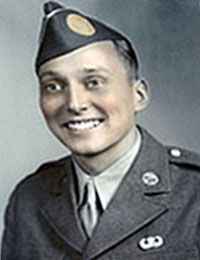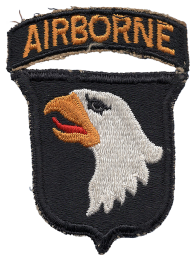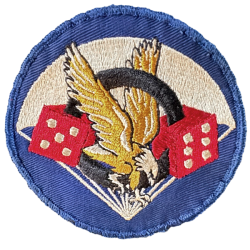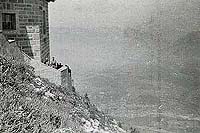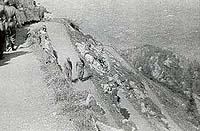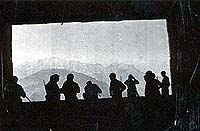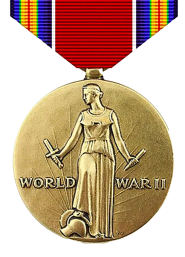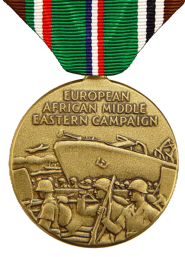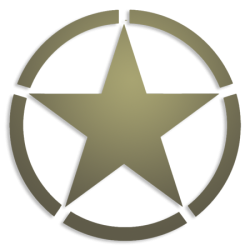My name Is Ray Aebischer, former member of Company F, 506th parachute Infantry Regiment, 101st Airborne Division. Before getting into the events of D-Day, June 6, 1944, I will go back and briefly outline some earlier beginnings.
I was born on a farm in Sherwood, Washington County, Oregon, USA about 20 miles west of Portland on January 11, 1918, the youngest of eight children, and the only one to serve in the military in WWII. Me moved to Newberg, Oregon in 1922, another small town about seven miles from Sherwood, population 3000. It was here I attended my eight years of elementary school. For High School, I attended a small academy in Greenleaf, Idaho for 2 years. My junior year, I went to school in Tigard, Oregon, while living with my brother Ed and his wife on the old family farm in Sherwood. Having completed the 11th grade, and wanting a change from farming life, I hitch-hiked my way south, arriving in San Francisco in June 1935, with less than $2.00 in my pocket, and one change of underclothes.
Through and employment agency, I secured a job in San Jose on a dairy farm. I continued to work thereand in the downtown creamery while attending my senior year of High School. Upon graduation in 1936 from San Jose High School, I continued to work in the nilk and ice cream business until receiving greetings from President Roosevelt, stating that I had been selected to serve in the armed forces. I can vividly recall the news on radio on Sunday, December 7, 1941, of the attack on Pearl Harbor, as I made the deliveries of milk and ice cream to restaurants and grocery stores. Many men volunteered for military service immediately to get their choice of service, while others looked for jobs in shipyards and other war time related work. Having the feeling that this war wasn't going to be over in a few days, weeks, or even months, I decided to wait for the inevitable letter to report for duty. Having been classified 1A, the day finally arrived in July 1942. I was told to report for a physical exam in San Francisco.
After taking the physical and oath of enlistment, I was placed on reserve status until September 1942, which allowed for time to put my personal affairs in order. The second letter ordered me to report to the Presidio of Monterey for active duty. During the in-processing, I was given the opportunity to volunteer for various branches of the Army, with no promise that it would be honored, as the largest numbers of men were needed in the combat arms, ie, Infantry, Artillery, and Armor. I thought parachuting would be the fun thing to do, and I could still serve icy country, and get into the action by volunteering for airborne duty. Having made this choice, I was sent to Camp Toccoa, Georgia for basic training.
It was at Camp Toccoa, that the 506th Parachute Infantry Regiment was being formed by a small cadre of Officers and NCO's. The rest of the Regiment were civilians, now in uniform. In mid-December 1942, following basic training, we were scheduled to go to Fort Benning, Georgia for jump school. The 2d battalion, of which I was a part, walked the first 115 miles to Atlanta, Ga., with full field equipment and weapons, a three day trek in rain and cold, following secondary roads, whenever possible, otherwise we walked along the main highways. The third night, we bivouacked on the shores of silver lake at Oglethorpe University campus. Rising before dawn the next morning, we marched down Peachtree Street, to the train station, where we boarded a train for Fort Benning, Georgia.
It was at Fort Benning where we received our jump training, each man packing his own parachute for the five qualifying jumps. After receiving our parachute wings and a Christmas dinner, we were given leave of absence until after New Year day 1943. Upon return from leave, we moved to Camp Mackall, KC, near Fort Bragg military reservation and Southern Pines, NC. More field training continued here until June when we left for maneuvers in Tennessee.
After two months on maneuvers, it was on to Fort Bragg NC for processing for overseas. Next station. Camp Shanks, MY and boarding troopship in NY harbor. In September 43, after a 10 day zig-zag, all expense paid cruise across the Atlantic, we arrived in Liverpool, England. The ship was overbooked, so we took turns sleeping, one night on deck, one night below, in hammocks. Meals were served around the clock, 24 hours as day. Everyone was given a mess card, with the time and assigned table number for the two meals served each day. No one knew when or where we would see combat, so training, along with more practice jumps continued until May of 44, when we were sent to marshalling areas near airports for classified briefings about the upcoming mission.
I will interject here, that the 9 months in England was not without some time off. The 2d Battalion, 506th PIR,was billeted in a small, sleepy, five pub town south of Swindon,and approximately 75 miles west of London. The barracks and sacks where we laid our sleepy heads were never overwhelmingly comfortable nor luxurious, but there were times during field problems, held in the middle of the raw English winter, when those Niessen huts and tar-papered shacks looked as inviting as the hearths of home. Aldbourne, the name of our village,was as two-pound taxi jump from Swindon, so we visited there quite often, hoping to see some bright lights, but found only blackout, most of the pubs closed, and long queues in front of fish and chip shops that were open.
For weekend and 3 daypasses, London was the favorite place, with numerous Red Cross Clubs that had meals, and various forms of recreation. When Hitler's buzz bombs came over, everyone knew that when the motors stopped, there would soon be an earth shaking explosion, fire, and another building in London destroyed. Most of the London populace headed for the underground (subway)shelters, but most G.l.'s carried on as though all was normal, and took their chances. Training became more Intense in May, as everyone knew that the moon controlled the tides, and the tides controlled the beaches. We also knew it was a matter of days before we would be going places other than England. The jump training problems were actually dress rehearsals for the coming invasion. We studied maps and air photos of the French coast, polished details int he mass team work that would be vital to the success of the coming combat mission; mainly getting control of the beach exits, seizing the bridges and causeways and cutting any and all utility cables we could find. Finally, on May 25th, we cleaned up around our barracks area, and put personal items in duffle bags to be left behind in camp.
We were issued new clothing and equipment, although we still didn't know when the big day would be. On May 28th, we left by train to an airport nearer to the coast of France. Once in our marshalling yard, we tried on and adjusted 'chutes, packed equipment to be secured to the bellies of our C 47's. We drew our ammunition grenades, riflebandoliers, carbine and tommy gun clips, machine gun boxes andbelts, bazooka and mortar rounds. We stood before large maps and around sand tables while being briefed by our squad and platoon leader. Actually, these last few days prior to D-Day were some of the easiest I had encountered in many months.The Engineer unit that fed us did an excellent job, with a steak ice cream finale. Evenings were spent going to movies,or just sitting around talking about wives, girl friends, home,the escapades at Picadilly Circus and what now seemed to be a very distant country, the US of A.
As I wrote in ay diary upon return to England about six weeks after D-Day, my unit had the objective of taking the town of Pouppeville on the Cherbourg peninsula. As the machine gunner of my squad, it was my duty to carry the 30 caliber, air cooled, light machine gun into combat. To do this it was necessaryto have some means of carrying it without holding it in my hands,which would have been impossible to hold on to during the jump. A canvas bag had been devised, which was strapped to one leg. Everything I carried, machine gun, ammunition, grenades, landnine, carbine, composition C explosive, X rations and personal items was in this bag. In reality, the extra ammo, larger items such as mortars, and equipment which had been strapped to the belly of our C 47, was to be retrieved upon landing, or as soon as possible after landing. About 1500 hours (3PM) on June 5th,we received word that this was the night.
After a good meal,we checked and rechecked all equipment, reviewed memorized passwords, and moved to the side of our aircraft, waiting forthe moment to start loading. Strapped in our canvas seats alongthe sides of our C 47, we finally were airborne about 2300 hours.I don't know where we went during the next two hours. However, I was aware of the fact that for such a fleet o£ aircraft and gliders to make the mass jump and landings into Normandy I ttook tine for all the thousands of planes to rendezvous and get in flying formation. It was obvious when we came to the coast of France by the flak exploding in the night sky, and tracer bullets coming up from the ground, drumming like hail through the wings and sides of our plane. Pilots began to swerve and dive, and take evasive action. Instead of slowing down,as they usually did in training jumps, it seemed like they did just the opposite by going faster.
Since I carried the heaviest load of the men in my aircraft, I was positioned number 2 man, directly behind my platoon leader. Soon the red light cameon, which is the signal to stand up, hook up. Just seconds before the green light came on, indicating that it was time to go, the platoon leader took a bullet across his upper lip. Never faltering, ho went out tho door, and the rest of us followed. I never saw him again. During these few minutes of anxiety my thoughts wore mostly to get out of this airplane and get on the ground. What we faced there, none of us really knew. With a queasy feeling in the pit of my stomach, there was no denying that I was quite scared, and by the looks on the faces of my buddies, I'm sure they felt the same way. What I am about to describe next, all took place in about three seconds, although it takes longer to tell. As I exited the door, the 'chute deployed in the usual time, about three seconds. As we were flying at a greater speed than what we normally do for parachute jumping, the jolt from the opening shock was more intense than usual. At the same second the chute opened, my leg pack broke loose from the straps around my leg.
All of my equipment, except one trench knife, and a canteen of water attached to my cartridge belt, went plummeting to the ground, never to oe seen again. Not by me anyway. As the planes were at a very low altitude, somewhere between 500' to 1000', I was on the ground a few seconds later, landing with a thud on some concrete in a church yard, I remember removing my parachute, grabbing my trench knife, and slowly moving toward the church door, thinking that if I could get inside I would have some security and some time to collect my thoughts toward the next move. The church bells were constantly ringing, drowning out any hopes of communicating with other members of my unit. Not seeing any movement in the moonlight by any person, friend or enemy, I felt very much alone Trying the church door, I found it locked. Not wanting to attract attention or be a living target for some German soldier, I crawled around the church to the rear, then along a high cement wall which surrounded the church grounds. At the same time, a machine gun was firing down the street. As another wave of friendly aircraft flewover, the machine gun was directed toward the planes. This appeared to be a good time to make a run for it, so I dashed across the street and into an orchard. As the planes flew off in the distance, the machine gun began firing down the street again.
One man (I don't know who) whose 'chute had gotten caught high in the trees in the church yard, was hanging there lifeless. He had either been shot while descending or upon being trapped in the tree. In the moonlight, I could see another trooper, still in his parachute, lying on the street, obviously caught in the gun fire, no movement, no sound for help. As it was urgent to get on with the mission assigned, my only thought for the moment was how to defend myself against an enemy soldier without any weapon but this one trench knife. I kept a firm grip on it, realizing that I would have to be quick to survive.I did not know at this time in what town I had landed, but later learned it was St. Mere Eglise, some distance from our objective. As I crawled along the ground, In a direction away from town and the church, I came upon what I thought was an American soldier. By the light of the moon, I could see the silhouetteof his shoulders, and the familiar outline of his helmet. Without making a sound, I crawled to within three or four feet of this man. He gave no indication that he heard me. I first tried the cricket which each man had been issued to use in lieu of password or other identification.
For those reading or hearing this account of D-Day, and not familiar with the "cricket" as it was called, I will attempt to describe it. They were actually kids toys, which, as the name implies, made the sound of a cricket. It looked like a walnut size shell, flat on one side, with a piece of metal inserted, when the metal was pinched between the thumb and forefinger, a sound was produced, like a cricket, or a snapping of the fingers. I believe the Army must have bought all the stock that could be had from Woolworth. To continue on, the cricket I had didn't work, apparently broken or mashed, so I whispered the password, ready to plunge the one weapon I had, a trench knife, Into this persons body in case he turned out to be unfriendly. He quickly turned around, facing me at the same time bringing his rifle in firing position, I was most thankful that he had the restraint not to fire too quickly. Instead, giving the reply to my password. For this we were both much relieved. How, I felt much more secure, as we had one rifle between us. As time went by, we could hear the bombardment of the beaches of Normandy by Army Air Corp. bombers and Navy ships off shore, shelling the German defenses along the coast.
As the faint rays of daylight appeared, the intensity of the bombing increased. It seemed that every destructive means known to man was concentrated on these beaches. In our minds, we knew that soon the allied forces would be coming ashore, wave after wave of armed men intent on securing a foothold on these beaches.I never did really doubt that the Invasion would be successful; however, there was the obvious end result not only for me, but for all of the troops already on the continent should the invasion end in failure. As daylight appeared, it was much easier to recognize other G.I.'s. Having been scattered over miles of terrain, it was a slow process of getting together in our own units. As we saw other U.S. soldiers, some from my own company, some not, we teamed up with whomever we met,the ranking officer or NCO taking charge. We followed his orders and supported him in his objective, whatever it was. In reality, it was mass confusion. Not many of us had landed where we were supposed to. All of the map and sand table studies prior to D-Day were of no help. If we were confused and disoriented, apparently the Germans were also.
After daylight, I saw noGerman soldiers for quite a while. They were either in hiding, or had taken off in haste for parts further inland. The few of us who had banded together by daylight, formed a column and started marching toward the objective of the officer in charge. What his objective was, I don't know to this day. I just followed. As we moved along, I kept looking for any weapons which may have been abandoned, or a supply pack which had been dropped from one of our aircraft, but no such luck. One of the men gave me a hand grenade, but that was rather useless for self defense. I don't recall how many men were in my group at this early morning hour, as we slowly, and cautiously walked along in a tactical column. Being near the rear of the column, I wasn't aware of the reason for our coming to a halt. Everyone immediately took up defensive positions along the road and waited. By word of mouth, I learned that the lead elements had encountered some German soldiers, who were driving eight horse drawn wagons, loaded with ammunition. Apparently, they were caught off guard, or didn't know that allied forces were in the area, as no shots were fired.
They surrendered without resistance. I later counted about 30 German soldiers, who we turned around and, along with the horses and wagons, took with us. Coming to a cross road, with a few farm buildings, we had the prisoners sit in as group along one side of the building. It was also my opportunity to pick up a German rifle, and have it available for use at any time. Going back to the time of capture, some of the men marching with us, who had been slightly wounded or hurt during the jump, were put in the wagons and taken along with us. These same men would be the ones to guard the prisoners for a while, as all able-bodied men continued on their mission. About mid morning, a few of us from my Company, having determined our location, decided to make a move toward our original objective, and hopefully Join the others from our unit. About noon, leaving the German prisoners, we decided to go In that direction.
We were crossing a largo open field when we heard the roar of what sounded like hundreds of motors. In the distance, it was difficult to distinguish the identity of these vehicles, so we just laid low for a while, until we recognized the markings and uniforms as our own. I just thanked God that the beachhead had been successful and that other units would soon be taking over the area. It wasn't until evening, about dusk, D-Day, June 6th, that I finally got together with my own company. Not everyone managed to join us the first day, as some were straggling in over several days. About the 4th day, a buddy of mine by the name of Lines Brown, who also jumped behind me, joined the outfit. He had been fighting with some other unit these four days. Lines was also my assistant machine gunner and close friend. Some of the men who had sprained ankles or broken legs from the Jump, were either sent or taken to the beach area, and were the first to be evacuated from the combat Zone.
This was one day that very little thought was given to food, but as time went on, eating eventually became important. As I had lost all my rations on the jump, I relied on eating food shared by my buddies, as well as some German rations which we captured from the ammo wagons earlier in the day. As darkness fell, it behooved us to prepare for the night. Not being in direct contact with enemy forces, and having established lines with friendly units, we set up perimeter type defense. Guard rosters were established so all could get some sleep. The ground was hard but that didn't really matter, as we were all tired and welcomed the opportunity for some rest. So D-Day for myself, and some of the other men in our unit, ended on a rather quiet note* I might add, however, that during the next six weeks In Normandy, there was plenty of action, with considerable loss of lives. However, the details are beyond the scope of this D-Day oral history. Footnote The term "oral history" is used in this writing.
The original newspaper article called on all veterans of the Normandy invasion to contribute their own taped oral historyto the D-Day collection at The Eisenhower Center. After putting my D-Day history on paper, I submitted the cassette tapes as requested.
